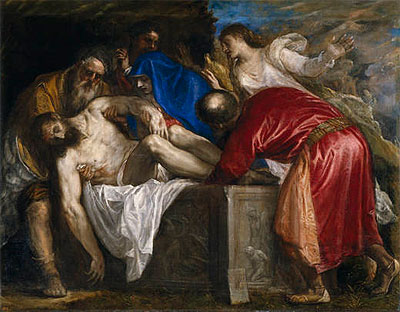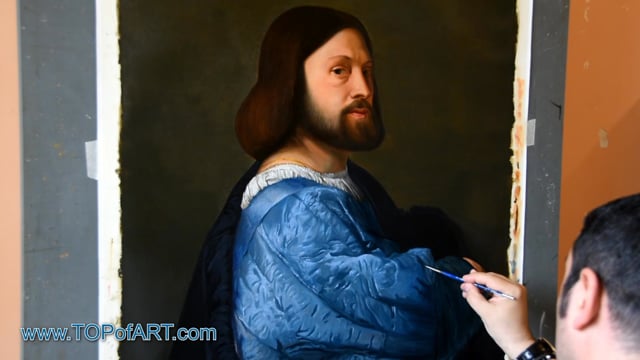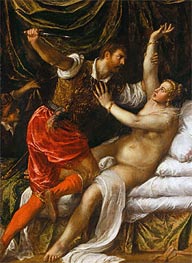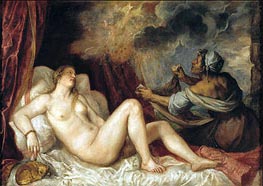The Burial of Christ, 1559 Tiziano Vecellio Titian (c.1485-1576)
Location: Prado Museum Madrid SpainOriginal Size: 136 x 174.5 cm
Own a museum-quality reproduction of The Burial of Christ by Titian (1559), exclusively hand-painted in oils on linen canvas by European artists with academic training. Each masterpiece is created with meticulous craftsmanship, capturing the exceptional quality and authentic brushwork of the original painting.


Recreating Titian: A Video Journey into Museum-Quality Reproductions by TOPofART
Video showcasing the process of hand-painting a Titian masterpiece with the utmost precision and care for detail.
Oil Painting Reproduction
If you want a different size than the offered
Description
Painted by European Аrtists with Academic Education
Museum Quality
+ 4 cm (1.6") Margins for Stretching
Creation Time: 8-9 Weeks
Creation Process
We create our paintings with museum quality and covering the highest academic standards. Once we get your order, it will be entirely hand-painted with oil on canvas. All the materials we use are the highest level, being totally artist graded painting materials and linen canvas.
We will add 1.6" (4 cm) additional blank canvas all over the painting for stretching.
High quality and detailing in every inch are time consuming. The reproduction of Tiziano Vecellio Titian also needs time to dry in order to be completely ready for shipping, as this is crucial to not be damaged during transportation.
Based on the size, level of detail and complexity we need 8-9 weeks to complete the process.
In case the delivery date needs to be extended in time, or we are overloaded with requests, there will be an email sent to you sharing the new timelines of production and delivery.
TOPofART wants to remind you to keep patient, in order to get you the highest quality, being our mission to fulfill your expectations.
We not stretch and frame our oil paintings due to several reasons:
Painting reproduction is a high quality expensive product, which we cannot risk to damage by sending it being stretched.
Also, there are postal restrictions, regarding the size of the shipment.
Additionally, due to the dimensions of the stretched canvas, the shipment price may exceed the price of the product itself.
You can stretch and frame your painting in your local frame-shop.
Delivery
Once the painting The Burial of Christ is ready and dry, it will be shipped to your delivery address. The canvas will be rolled-up in a secure postal tube.
We offer free shipping as well as paid express transportation services.
After adding your artwork to the shopping cart, you will be able to check the delivery price using the Estimate Shipping and Tax tool.
Museum Quality
The paintings we create are only of museum quality. Our academy graduated artists will never allow a compromise in the quality and detail of the ordered painting. TOPofART do not work, and will never allow ourselves to work with low quality studios from the Far East. We are based in Europe, and quality is our highest priority.
1 Reviews
5.00 Overall rating
The canvas was commissioned by Philip II in 1559 and was sent to him in the same year. It has capital importance in the development of Titian's style. The portrayal of the tragedy, which the painter had masterfully achieved in epic form in a youthful work now in the Louvre, is here shown in terms of a living, suffering participation to which the pictorial language is extraordinarily appropriate.
It is significant that the bearded Joseph of Arimathea, who supports the body of Christ, is more than probably a self-portrait. Knowingly composed, the figures are distributed in a fan-like scheme and are racked by spasms of grief. But it is the colour that controls all the elements, starting from the livid body of Christ and from the white shroud falling over the side of the tomb, which is decorated with bas-reliefs. The last are the only unessential, ornamental notes in this tragic group. The bloodless body of Christ and the weight of His listless arm are unforgettable.
Unforgettable, too, is the figure of the Magdalen. Most extraordinary, however, is how colour creates the individual figures, so that the space is reduced, attenuated and leaves us breathless. Dvorak rightly suggested that in this moment Titian, 'renouncing the intoxication of the senses of his youthful works, had sought to find himself in a higher and more remote region of the spirit.'
There is much to say about Titian's sense of religion, which is not to be confused with any didactic or pietistic zeal of the type that activated Counter-Reformation policy in the arts and was urged on him by some patrons - as exemplified in a canvas in the Prado titled Spain Succouring Religion which in fact consists of two feminine beauties counterpoised, one richly dressed, the other nude. Yet a dramatic concept of humanity in terms of its myths and its history, and of the nature that seems to echo it, is more and more apparent in the works of the last period, from the late Entombment and St. Lawrence, also in the Prado, to the St. Sebastian in St. Petersburg and Apollo and Marsyas in Kormeriz, Czech Republic.

Tarquin and Lucretia c.1571
$2702
$76.32
Tiziano Vecellio Titian
Original Size:188.9 x 145.1 cm
Fitzwilliam Museum, Cambridge, UK

Danae receiving the Golden Rain 1553
$1921
$117.76
Tiziano Vecellio Titian
Original Size:129.8 x 181.2 cm
Prado Museum, Madrid, Spain

Ranuccio Farnese 1542
$1803
$81.78
Tiziano Vecellio Titian
Original Size:89.7 x 73.6 cm
National Gallery of Art, Washington, USA

Salome with the Head of John the Baptist c.1550
$1846
$149.67
Tiziano Vecellio Titian
Original Size:87 x 80 cm
Prado Museum, Madrid, Spain

Boy with Dogs in a Landscape c.1565
$1495
$83.77
Tiziano Vecellio Titian
Original Size:99.5 x 117 cm
Museum Boijmans Van Beuningen, Rotterdam, Netherlands